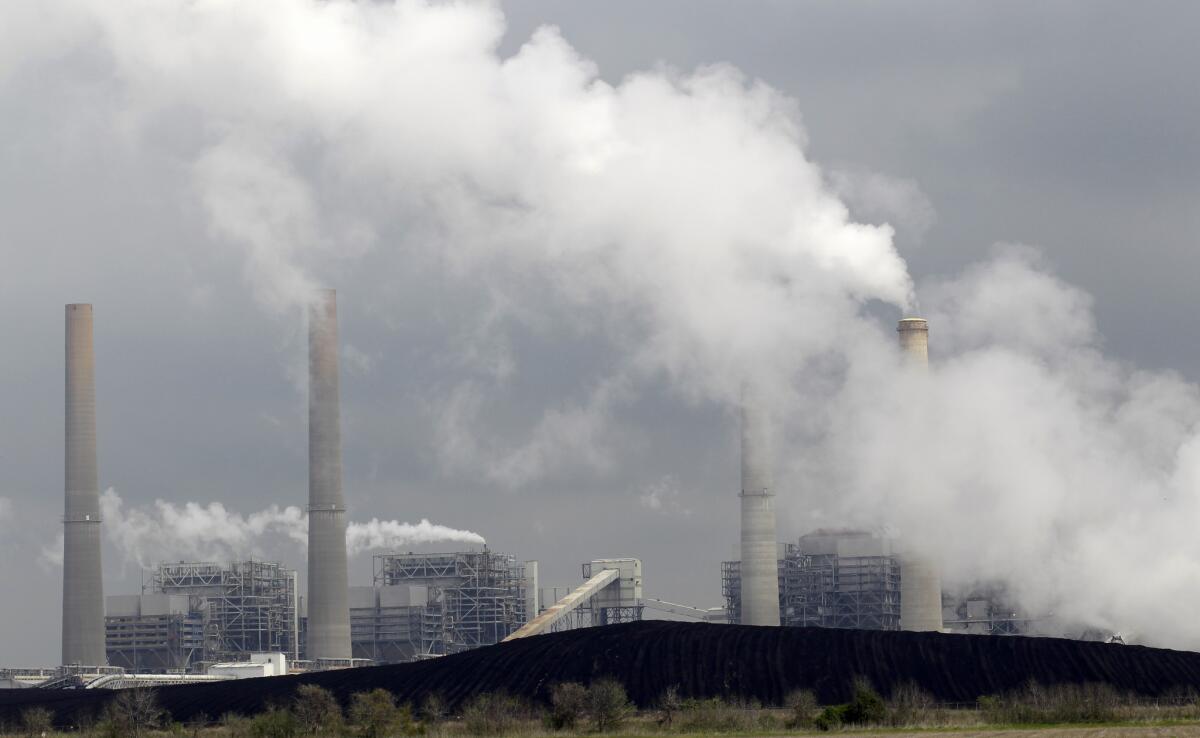Q&A: Carbon emissions will reach record high in 2019, thanks to the burning of fossil fuels

- Share via
A climate change milestone is upon us: The amount of carbon dioxide released by burning fossil fuels is projected to hit 37 billion tons this year, setting another record high.
The global tally, by an international team of scientists, makes 2019 the third consecutive year with rising CO2 emissions.
The good news (relatively speaking) is that the rate of growth slowed significantly in 2019. The amount of CO2 released this year was only 0.6% higher than it was the year before. That compares with growth rates of 2.1% in 2018 and 1.5% in 2017.
But Rob Jackson, an Earth systems scientist at Stanford University and director of the Global Carbon Project, said the slower growth offers little comfort to those concerned about mitigating the damage caused by global warming.
“We need emissions to decline, not grow more slowly,” said Jackson, who led the research.
The growth in emissions was not uniform around the globe, Jackson and his colleagues reported in three new studies published in the journals Environmental Research Letters, Nature Climate Change and Earth System Science Data. Both the United States and the European Union released 1.7% less CO2 in 2019 than they did in 2018.
However, China’s fossil fuel emissions grew 2.6% in 2019 and India’s rose by 1.8%.
The scientists also reported that while emissions created by burning coal fell 0.9% globally — and by 11% in the United States— coal still accounted for 40% of global CO2 emissions this year. Oil was responsible for 34%, while natural gas contributed 20%.
The new figures were released as negotiators from around the world gathered in Madrid for the 25th United Nations Climate Change Conference COP 25.
Jackson spoke to The Times about the significance of the new reports, why next year’s emissions might be worse, and what keeps him from falling into total climate despair.
Let’s start with the good news. What did you find promising in this new report?
The growth rate this year is substantially slower than the last two years, and that is being driven in part by policies that are increasing the growth of wind, solar and other renewables. People and companies are choosing renewables more on price than climate concerns and that’s a big transition.
Anything else that might give us hope?
Coal use in the U.S. and Europe is plummeting. In the U.S., our coal use dropped another 10% this year, and it has declined by half since 2005. That is saving tens of thousands of American lives through cleaner air, and it has already created hundreds of thousands of new jobs in renewables and natural gas. That’s far more jobs than we lost in the coal industry, so there are good things happening.
What’s the bad news?
Everything else.
Despite emissions growth that was slower this year than last year, we’ll still set another global record for carbon dioxide emissions. Growing more slowly is still more growth.
Were there any surprises?
Natural gas use is surging and it isn’t replacing coal — it’s providing new energy and heat to people around the world. So I think most of the global emissions increase this year is attributable to natural gas.
I also think that a 10% drop of coal use in the U.S. and Europe in one year is a remarkable change.
Is our increasing global reliance on natural gas a good thing or a bad thing?
Natural gas is cleaner than coal, not just for carbon dioxide pollution but also for particulates and mercury and other things that kill people.
It isn’t good though. It’s not as clean as wind and solar, and it’s not renewable. There is research underway to produce renewable biogas, but for now it is and will remain a fossil fuel. So even though it is less polluting than coal, it is still adding new pollution to our air.
You are projecting 2020 to be just as bad or worse for global CO2 emissions. Why?
I would love to see emissions drop in 2020. Instead what I see is rising natural gas and oil use that continue to march upward, and coal use that is dropping in some places and growing in others. Until we can halt the steady rise in oil and natural gas, I can’t see declining coal emissions being enough to counterbalance that growth.
What is the biggest hurdle to decreasing global fossil fuel emissions?
The biggest hurdle I see is transportation. The world is buying more cars and driving more miles. We’re flying more. Air travel has been up 5% a year in recent years.
Unlike electric cars, there is no electrical alternative for long-haul air traffic. We need to walk and bike more and take public transportation. We need electric cars coupled to clean renewable energy.
Zooming in on the U.S., are we heading in the right direction?
We’re heading in the right direction, but at the wrong pace.
Our emissions have declined slowly but steadily for a decade or more. That’s terrific, but we still generate on average twice as much fossil carbon dioxide pollution per person as someone in Europe or China, and 15 or 20 times as much as someone in Africa. So our emissions are dropping, but we are still using far more than our share.
Do you despair for the future or do you think we can turn this around?
I’m an optimist at heart. I have to believe there are ways to turn this around.
I despair over the pace of change. We’re not acting anywhere nearly quickly enough to stave off climate change that is already happening today. The North Pole ice melting in summer, the death of the Great Barrier Reef — these changes are happening now, and we blindly carry on churning out carbon dioxide as if nothing is going on.
This interview has been edited for length and clarity.







